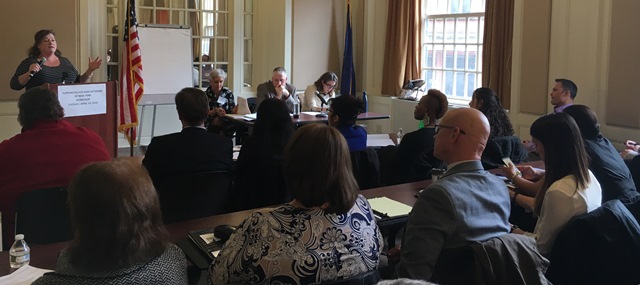Categories: Funding, New York State, Network Events
04.23.2018
The Network hosted two panel discussions last week on the Empire State Supportive Housing Initiative (ESSHI) in advance of this year’s Request for Proposals (RFP),scheduled to be released imminently.

The Network hosted two panel discussions last week on the Empire State Supportive Housing Initiative (ESSHI) in advance of this year’s Request for Proposals (RFP),scheduled to be released imminently. The workshops, held in Albany and Buffalo, highlighted the ESSHI process including what what’s new in the upcoming RFP, how to access capital funding through both OTDA HHAP (Homeless Housing and Assistance Program), and HCR (Homes and Community Renewal). A robust Q&A followed with the audience covering topics such as NIMBY and siting issues, pre-development funding and clarifications on changes around the Medicaid Redesign Team (MRT) population.
The panels, moderated by the Network’s Executive Director, Laura Mascuch, were comprised of representatives from three state agencies: the Office of Mental Health (Moira Tashjian, Associate Commissioner and Chair of the ESSHI Interagency Workgroup), Office of Temporary and Disability Assistance (Rick Umholtz, Director for the Bureau of Housing & Support Services) and Homes and Community Renewal (Leora Jontef, VP of Multifamily Finance-New Construction & Sean Fitzgerald, Assistant Commissioner). In the audience were many of the state agencies also involved in the ESSHI Interagency Workgroup including NYS Office of Alcoholism and Substance Abuse Services (OASAS), NYS Office of Children and Family Services (OCFS) and NYS Office for the Prevention of Domestic Violence (OPDV). Over 150 people attended the events including a mix of nonprofit members, developers, bankers and syndicators.
Several clarifications were discussed. The new RFP will treat the Medicaid Redesign Team (MRT) category differently. Projects serving mental health, substance use disorders, HIV/AIDS, and other Department of Health subpopulations that include 30 or more ESSHI units will be required to dedicate at least 25% of those supportive units to high Medicaid users.
The panelists also clarified that ESSHI will grant extensions beyond the 12 month conditional award period for projects that have demonstrated they are further along in the development process, but they also stressed that there is no penalty for re-applying annually.
Attendees were encouraged to talk to both OTDA and HCR about possible projects early on in the process. Both OMH (Office of Mental Health) and OASAS, have predevelopment funding available that can be accessed once a conditional award is issued.
The Network wishes to thank our hosts for these events, NYS Homes and Community Renewal in Albany and Evergreen Health Services in Buffalo. Both workshops were followed by networking mixers that were robustly attended. We would also like to acknowledge and thank our funders, the Oak Foundation, the van Ameringen Foundation, Robin Hood, New York Community Trust, JPMorgan Chase, Deutsche Bank and Capital One for their generous support of the Network’s Getting to 35K Capacity Building Initiative.
